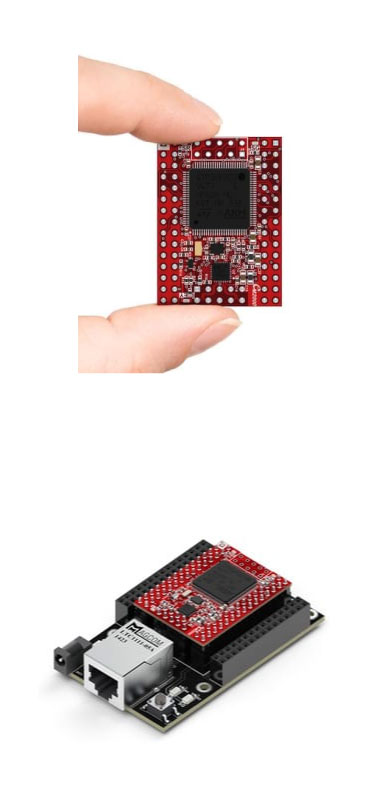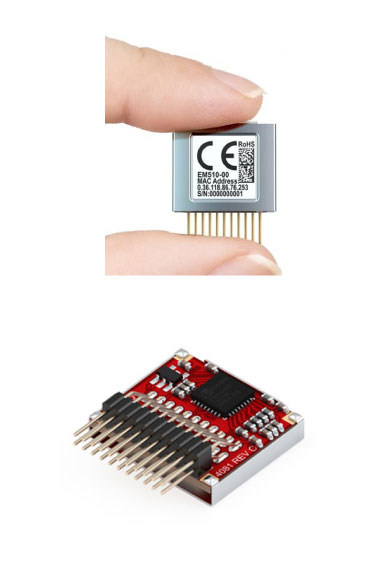Modules & Boards :
WM2000 Programmable Wireless IIoT Module
The WM2000 is ideal for creating IIoT solutions that are free from the limitations of traditional wired networks.
The simplicity of Tibbo BASIC/C — aided by Cody, our template project generator, and TIDE — ensures timely and cost-effective development of stable, dependable applications.
The WM2000 is the first programmable wireless IndustrialIoT (IIoT) module offered by Tibbo.
• 32-bit architecture
• Built-in Wi-Fi (802.11a/b/g/n) interface
• Built-in Bluetooth Low Energy (BLE 4.2) interface
• 2048-byte EEPROM for data storage
• Wi-Fi auto-connects
• Wireless debugging
• Transport Layer Security (TLS)
WM2000EV Development Board
The WM2000EV is a great starting point for evaluating the capabilities of the WM2000, Tibbo's programmable Wi-Fi/BLE module
The Kit was designed to be completely self-contained and enable the exploration of the module's features without having to wire in any external circuitry
• I²C temperature sensor
• I²C light sensor
• Jumpers and test points:
• For measuring the current of the WM2000 and the entire board
• For enabling the low-power mode
• For selecting the RTC power source (3.3V or backup battery)
.jpg)
The EM2000 is programmable in Tibbo BASIC and Tibbo C. Develop your very own IoT solution from scratch or take inspiration from our open-source applications and code samples published in the Code and Apps section.
- 32-bit architecture (vs. 16-bit architecture of the EM1000).
- Five to 80 times better performance, depending on the calculations and variable types.
- Seven times faster GPIO manipulation.
- Three times larger available user SRAM (66KB vs. 22KB).
- 1.5-3.0 times faster graphics.
- 2.2 times lower power consumption (100mA vs. 220mA).
- Two times larger flash memory (1MB for TiOS/code + 1MB for the file system vs. 1MB total for TiOS, code, and file system).
- 56 I/O lines (vs. 54 lines on the EM1000).
- Four-channel ADC.
- The ability to update TiOS firmware and compiled Tibbo BASIC/C app over-the-air (this requires the WA2000 add-on module).
EM2000EV Development Board
This evaluation board offers the bare essentials required for testing the EM2000 Tibbo BASIC/C-programmable IoT module. The board carries the sockets for the module, additional sockets for connecting to external circuitry, a power jack, and a power regulator, RJ45 jack (Ethernet port), MD button, and three status LEDs.
The EM2000 module is not included with the board and must be purchased separately.
For more information, see the EM2000EV documentation
This evaluation board offers the bare essentials required for testing the EM2000 Tibbo BASIC/C-programmable IoT module

The module offers substantial performance improvements over its predecessor
Compact dimensions, space-saving "vertical slice" form factor, low power consumption, and economical pricing make the module an excellent fit for miniature, cost-sensitive IoT devices.
Module testing and evaluation can be performed with our EM510EV development system.
Key Features
Mid-range ARM CPU
10/100 Base-T Ethernet port
(no RJ45/magnetics)
Optional Wi-Fi connectivity
(with the WA2000 add-on)
Optional BLE (Bluetooth Low-Energy) connectivity (with the WA2000 add-on)
1 UART, supports serial, Wiegand, and clock/data streams
10 general-purpose I/O lines
4 synchronous serial ports with
SPI and I2C modes
512K flash for TiOS and application, support for external 1MB ?ash disk

EM1206 Programmable IoT Module
The EM1206 is a compact Tibbo BASIC/C-programmable IoT Module with Ethernet, as well as optional Wi-Fi* and 4G/LTE** connectivity. The EM1206 has four UARTs.
In combination with the RJ203 jack/magnetics front-end (shown), the EM1206 forms a complete programmable Ethernet node occupying only 34.4 x 20mm (1.35 x 0.79") of the host board's space.
The module's potent hardware mix, which also includes the onboard flash memory hosting a hardened fault-tolerant file system, as well as the EEPROM and RTC, has been carefully tailored to address the typical needs of network-enabled control applications. Thus, the EM1206 is especially suitable for "connected" edge products such as sensors, data collectors, meters, and actuators.
The EM1206EV board plus accessories. The board comes with the RJ203+EM1206 module combination (soldered in) and, optionally, the WA2000 Wi-Fi add-on.
Also included on the board are the RJ45 jack with magnetics, power jack and regulator, one RS232 port with a DB9 connector, Wi-Fi add-on socket, LEDs, MD (setup) button, and a pin header for accessing the module's I/O pins.
b]-WA2000 Wi-Fi/BLE Add-on Module
To enjoy Bluetooth Low Energy (BLE) functionality offered by the WA2000, consider upgrading to Tibbo's ARM-based programmable devices.
This device cannot operate by itself. It has to be controlled by one of our compatible products.
B] Programmable IoT Boards
1. EM2001 Programmable IoT Board
The EM2001 is a full-featured Tibbo BASIC/C-programmable IoT Board with Ethernet, as well as optional Wi-Fi*, BLE* (Bluetooth Low Energy), and 4G/LTE cellular** connectivity. The EM2001 has four UARTs. The board offers substantial speed and functionality improvements over its predecessor — the original EM1001 device.
2. EM1001 Programmable IoT Board
The EM1001 is a full-featured Tibbo BASIC/C-programmable IoT Board with Ethernet, as well as optional Wi-Fi* and 4G/LTE cellular** connectivity. The EM1001 has four UARTs.
The device's capabilities are further enhanced by the onboard flash memory hosting a hardened fault-tolerant file system, as well as the EEPROM and RTC. The RTC backup supercapacitor can be installed on the board ("-S" ordering option) or connected externally.
C] SoI-only Modules
1. EM100 Serial-to-Ethernet Module
EM203 Serial-to-Ethernet Module
In combination with the RJ203 jack/magnetics front-end (shown), the EM203 forms a complete Ethernet node occupying only 31x20mm (1.22x0.79") of the host board's space.
The EM203 is compatible with Tibbo Device Server Toolkit (TDST) for Windows. TDST includes the Virtual Serial Port Driver (VSPD), which enables you to use the serial port of the module as a remote COM port of your PC. The Linux version of the VSPD is available as well.
-10/100 Base-T Ethernet port
-One UART
-Mates with the RJ203 jack/magnetics front-end
-5V power
2. EM100 Serial-to-Ethernet Module
The EM100 is Tibbo's original "orange block" 10BaseT serial-to-Ethernet module.
The EM100 carries the Ethernet magnetics onboard and thus requires only one external component — an RJ45 Ethernet connector.
The module is fully sealed for maximum environmental protection.
This device is compatible with Tibbo Device Server Toolkit (TDST) for Windows. TDST includes the Virtual Serial Port Driver (VSPD), which enables you to use the serial port of the module as a remote COM port of your PC. The Linux version of the VSPD is available as well.
-10 Base-T Ethernet port, magnetics onboard
-One UART
-Fully sealed (potted with epoxy)
-5V power
The WM2000 is ideal for creating IIoT solutions that are free from the limitations of traditional wired networks.
The simplicity of Tibbo BASIC/C — aided by Cody, our template project generator, and TIDE — ensures timely and cost-effective development of stable, dependable applications.
